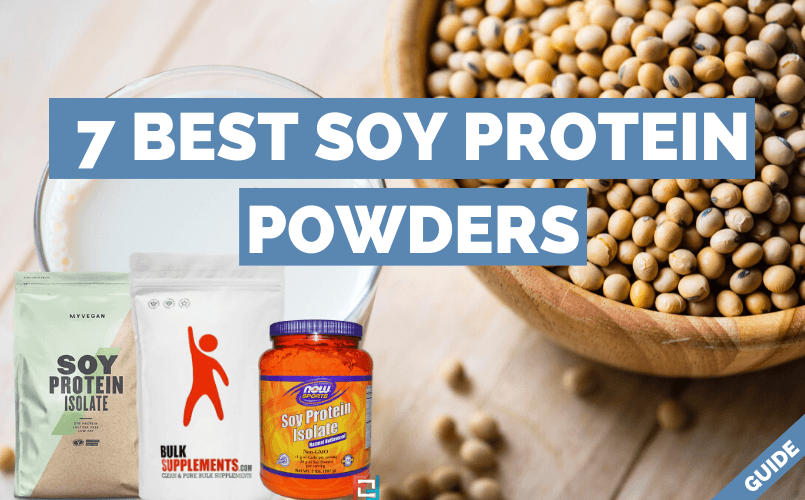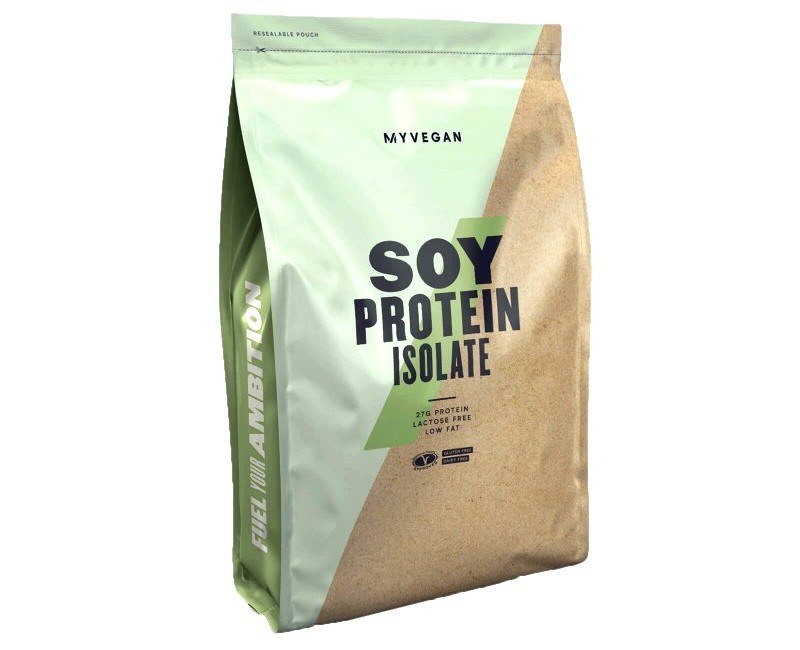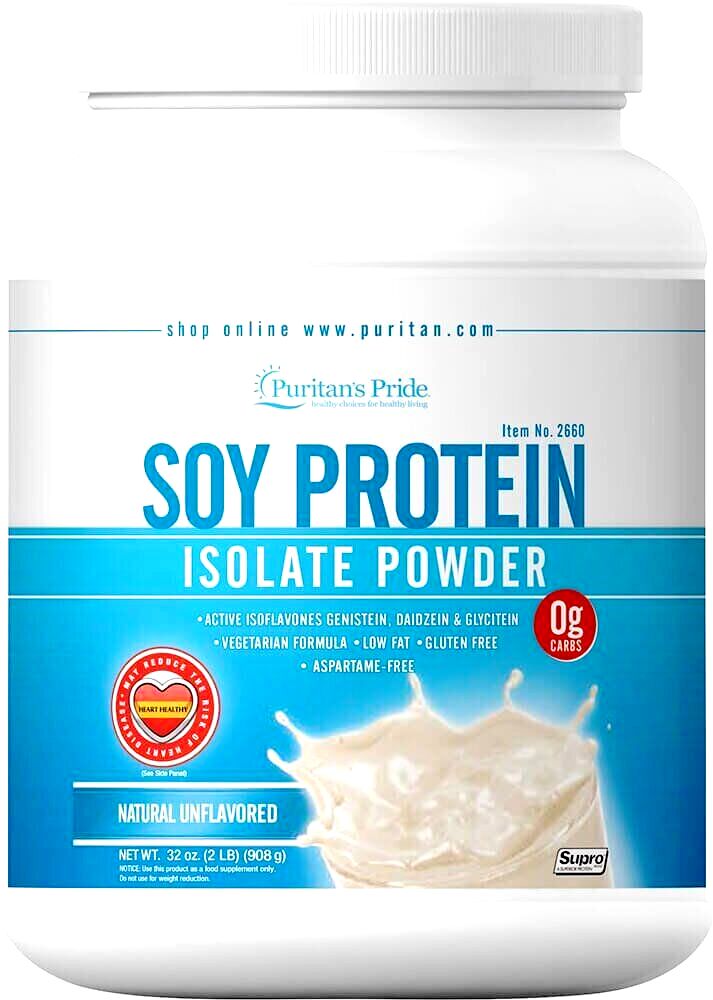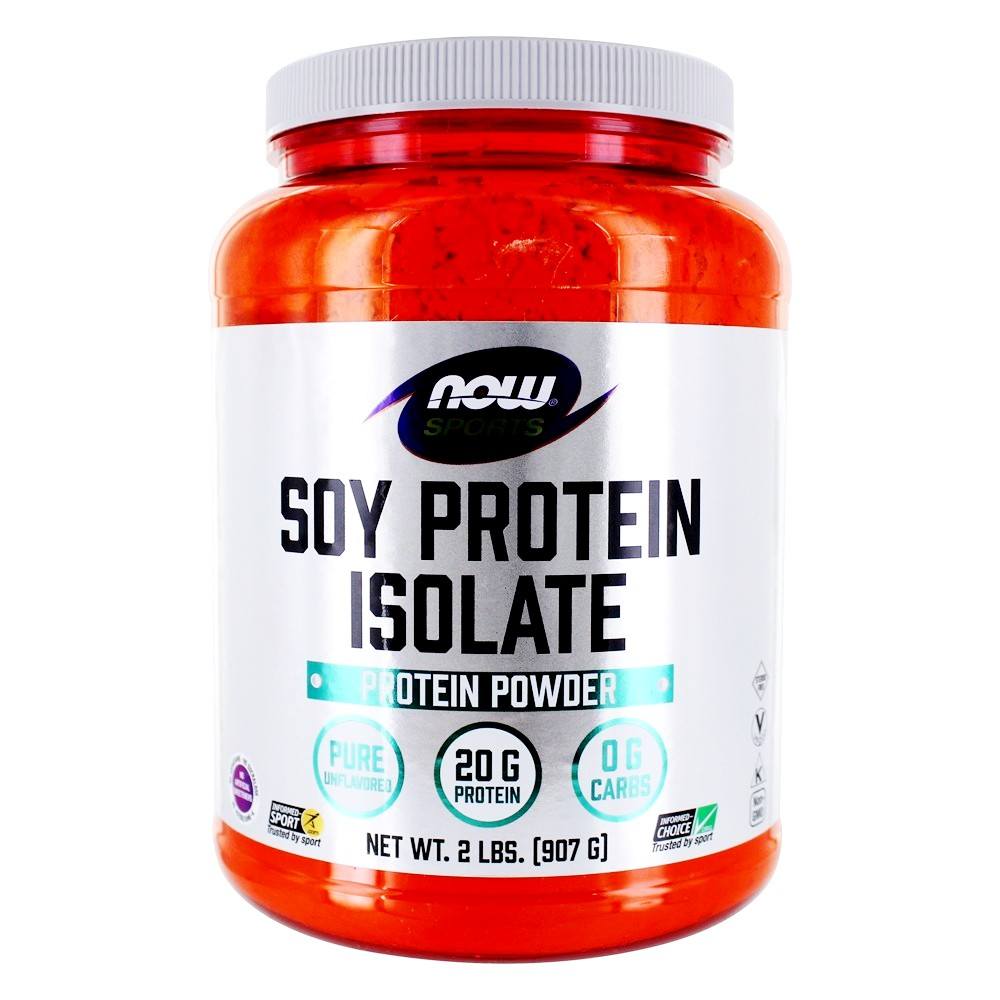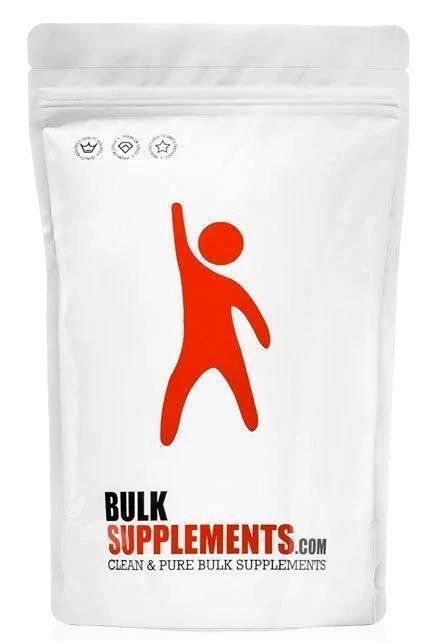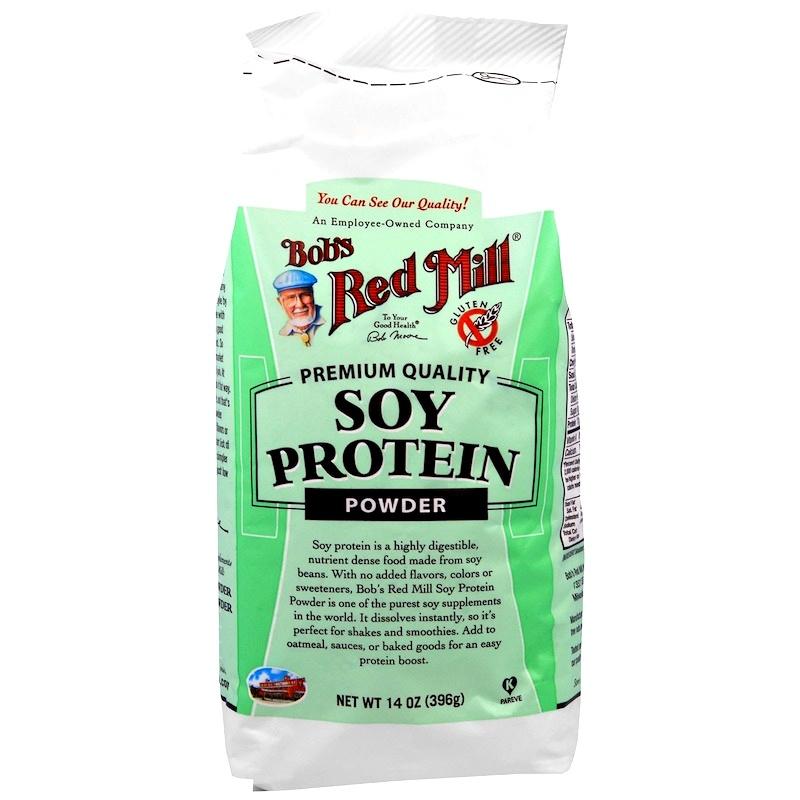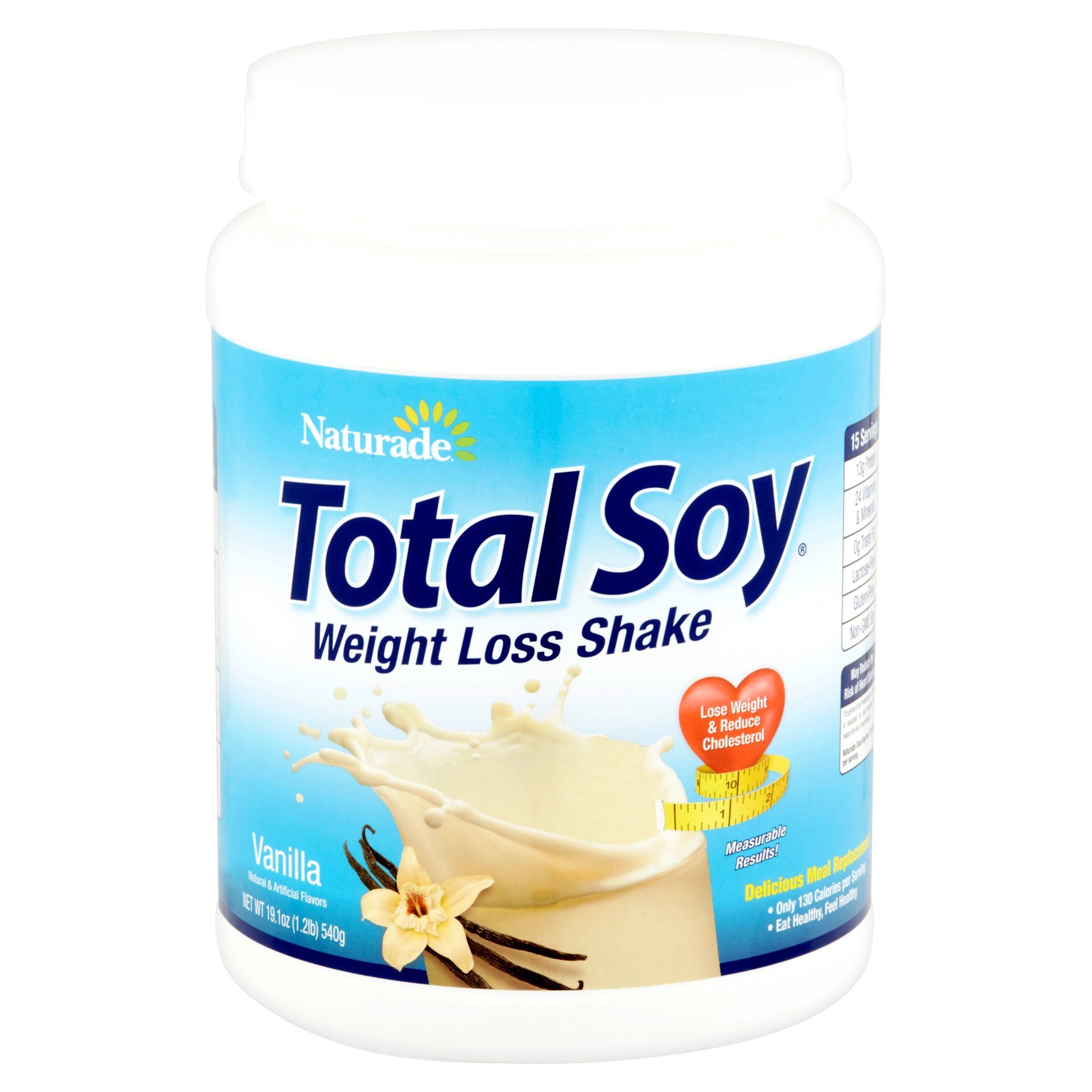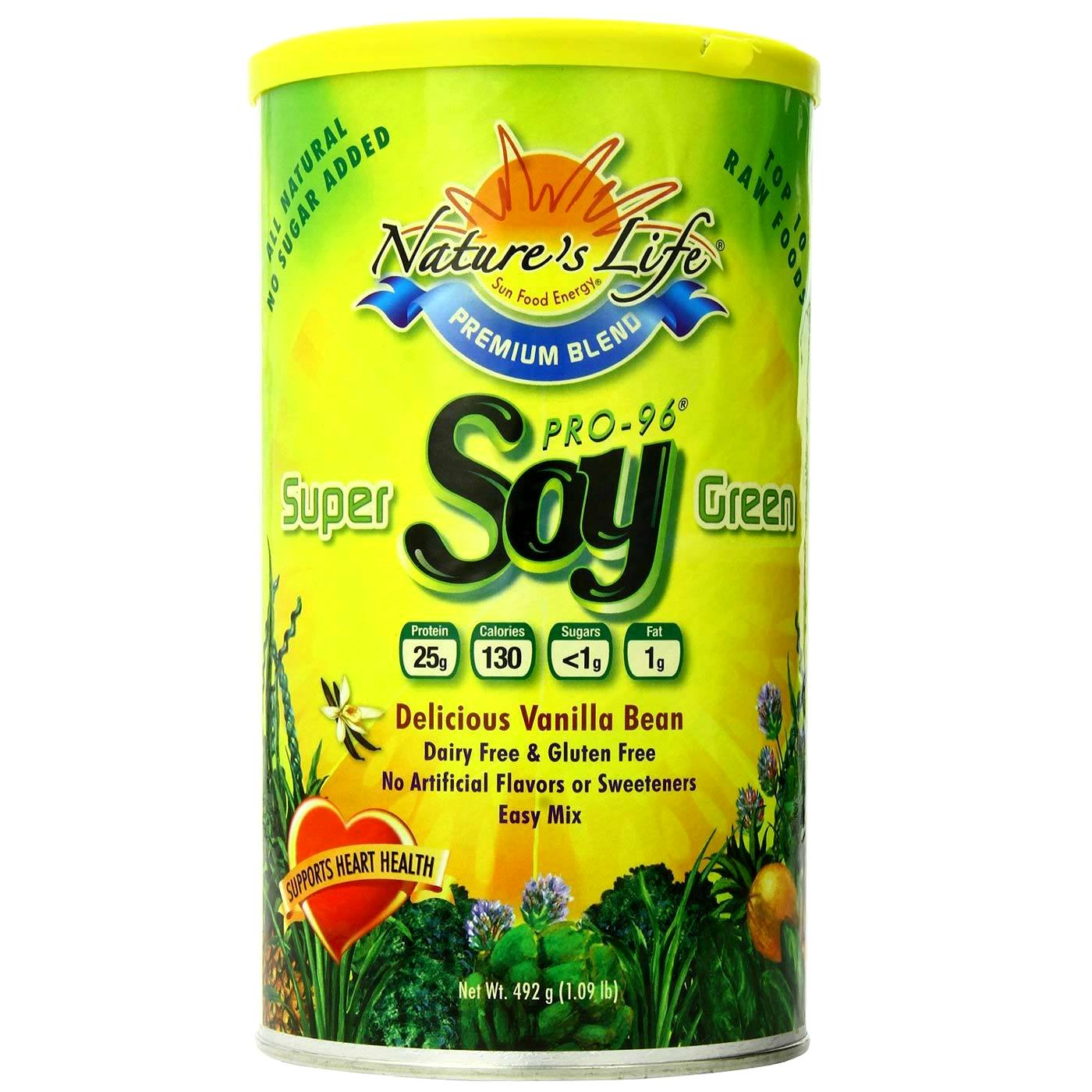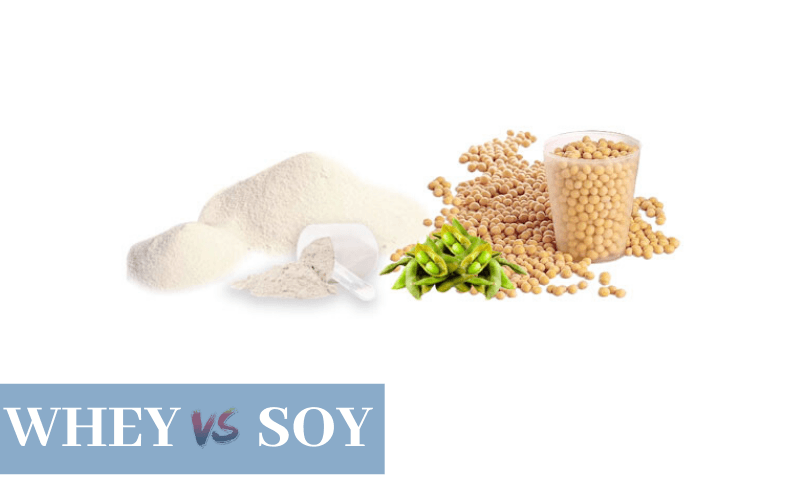Protein supplements, in general, are very popular for anyone who wants to lose weight or gain muscle.
However, soy protein powders are usually surrounded by an air of controversy.
Soy protein powders, in general, are a very good source of complete proteins and amino acids. However, they are not as effective as whey protein when it comes to weight loss and muscle building. However, if you are lactose-intolerant, it is still a popular pick.
Review Summary:
- 1. Myprotein
- 2. Puritan’s Pride
- 3. Now Foods
- 4. Bulksupplements
- 5. Bob’s Red Mill
- 6. Naturade Total
- 7. Super-Green Pro-96
Table of Contents
7 Top Soy Protein Powders (List for 2024)
Protein powders, in general, are in high demand. And with the growing trend of different diets, it’s no surprise that you’ll find more than a handful of soy protein powders on the market. I’ve taken the liberty of compiling seven of the best protein powders in the market for you to choose from:
1. Myprotein Soy Protein Isolate – Good For Lean Muscle Building
Myprotein comes in three flavor choices, such as unflavored, chocolate stevia, and vanilla stevia. You’ll also find it in 2.2 pounds or 5.5-pound bags.
This vegan-friendly blend of soy protein contains 90% protein and no gluten, is naturally sweetened, and flavored, and is advertised as well as protein powder for building muscles.
Here’s why you’ll like it:
Mixes Nicely – although some people are worried about the effects of soy protein supplement feeling a bit chalky, this blend is beautifully formulated so that it mixes in beautifully with other drinks. If you opt for the unflavored version, you’ll be able to mix it with any drink of your pick to create your own flavors.
Reduces Inflammation – Myprotein is perfect if you’re looking for a supplement that will help you reduce inflammation and facilitate quick recovery after a workout. It contains a dose of calcium similar to what you would get from soy milk and is packed with 26g of protein per serving which is a good amount for muscle building without mixing in lots of crap ingredients.
- 26 grams of protein per serving
- Clean energy
- Facilitates quick recovery
- Mixes easily with any drink
- Great for men
- Might cause some bloating (gut microbiome dependent)
Summary: If you’re looking for a clean energy that is 100% vegan and loaded in high-quality protein, this Myprotein powder is the best choice for you. Each serving is loaded with 26g of protein which means you’re more likely to lose weight and build muscle quickly. Plus, it also facilitates quicker recoveries so you should be able to focus on your workouts more. All-natural powder makes it the best meal replacement shakes.
.
2. Puritan’s Pride
Puritan’s Pride is a highly established manufacturer of healthy living products for many years. This brand packs a whopping 24g of protein for every suggested serving.
It is also relatively affordable at only around $0.44 per serving. This low-calorie product is perfect if you’re looking for something that is also low in fat content and contains zero carbohydrates.
Here’s why you’ll like it:
Great Flavour and Mixes Well – this vegetarian blend is designed to be mixed with milk or your favorite beverage. It tastes nice on its own. However, it is similar in flavor to infant oatmeal. If you’re not keen on drinking it on its own, you also have the option to mix it easily with other drinks. You’ll be pleased to know that this drink is designed to dissolve quickly and does not leave a chalky texture or aftertaste.
- 100% soy product
- Vegetarian formula
- The versatile and easily mixable powder formula
- Comes in three flavors
- Affordable
- There is no complete official list of ingredients
Summary: Despite Puritan Pride’s trustworthy status, I still feel inclined to state that this product is something you need to be careful of. You’ll find very little information on it online and even on the Puritan Pride website, you don’t see a complete list of additives that could cause allergic reactions.
.
3. Now Foods
This Now Foods GMP-certified product is 100% natural, vegan, and free from steroids. It comes in two flavor options, and a single container contains 37 servings, so you’re getting a great value item with plenty of servings in it. It contains no carbohydrates and is verified by Informed Sport and Informed Choice.
Here’s why you’ll like it:
Pure and Unflavored – this protein powder is highly versatile. You don’t have to worry about not liking the taste because you can determine that for yourself by blending it with drinks you deem worthy of your palate.
- The great amino acid profile
- Versatile and mixes well
- Smooth formula
- Does not have negative side effects
- Soy protein is generally not very easily absorbed by the body
Summary: This powder mixes well and is quite smooth for a soy protein. More than that, it is pure and is guaranteed beneficial and high-quality by many governing bodies. You’ll appreciate the fact that while this particular formula is unflavored, it is great for adding into your favorite drinks so you are always able to discover something new in terms of flavour.
.
4. Bulksupplements
Bulksupplements soy protein isolate powder comes in many sizes, starting from a 100-gram starter pack up to a 5-kilogram powder pack.
However, the company does promise that it is free from additives and preservatives that you might find are the cause of any ill side effects in other powders.
This protein powder, in general, is complete in aminos, so you’re able to build muscle effectively and quickly. Moreover, it is rich in calcium and other nutrients that your body needs.
Take a look at why you’ll like it:
Lab Tested and Verified – one of the first things I look for in any supplement is quality. This high in protein powder may not be 100% pure, but it is lab tested and verified to be pure, safe, and effective. This means you’re unlikely to encounter side effects that cause you to bloat like a balloon or grow man-boobs over time.
- Guaranteed purity and quality
- Rich in amino acids
- 90% pure
- Vegetarian
- Does not tasty
- The packaging is not great
Summary: While the flavor profile and the packaging could use some updating, this nutrition is a great of calcium and complete amino acid nutrients. It is rigorously tested in a lab and verified so you know you’re getting a 90% pure protein.
.
5. Bob’s Red Mill – Gluten Free
This Bob’s Red Mill is manufactured by an employee-owned company and boasts quality that you can see. Without gluten, Kosher parve, and is reliably good in fiber and iron for any vegetarian who wants a pure protein.
And truthfully, Bob’s Red Mill is one of the purest soy-based supplements you’ll find in the market. This means you’re unlikely to develop any negative side effects. Any given soy product could be sourced from a wide variety of places.
Take a look at its best qualities:
Highly Versatile – this formula is used not only in drinks but it can also be used in baking (#1 pick for women). This makes it incredibly versatile and perfect for anyone who gets sick of drinking protein shakes every once in a while. It features a single ingredient and no other additives, so you know you’re getting a high-quality brand.
- Manufactured in a gluten-free facility
- Vegetarian
- Kosher parve
- Contains 17 grams of protein per serving
- Highly versatile
- Does not taste excellent
- Quite chalky
Summary: Bob’s Red Mill is a favorite pick in American households. However, you might want to training a bit of caution when mixing it into your food. It has a bit of a chalky consistency and it doesn’t taste awesome on its own.
.
6. Naturade Total – Best Tasting
This Naturade Total fat loss powder comes in a delicious vanilla flavor. It is touted as a meal replacement drink and helps you lower your cholesterol levels. It contains only 130 calories per serving and gives you more than half the daily dose; you need to remain healthy.
Here’s why you’ll like it:
Great Taste and Mixability – this Naturade Total is dedicated to replacing one of your meals. It is easily mixable in your blender with a variety of other fruits, vegetables, oats or drinks of your pick. On its own, it tastes delicious and is something you’ll look forward to every day.
- Clinically formulated for fat loss
- Tastes great
- Relatively affordable
- The protein content is quite low
Summary: Despite this nutrition tasting excellent and mixing well with other drinks, you might want to keep it on your shelf for losing weight specifically. The protein content is not as high as nutritionists require and it doesn’t really do much aside from replacing a meal.
.
7. Super-Green Pro-96
This Super-Green Pro-96 sugar-free and gluten-free powder is a perfect pick if you’re looking for something that will help you maintain a clean heart and a healthy lifestyle.
Here’s why you’ll like it:
Easy Digestion – unlike other brands, this formula contains a bean shield. This enzyme blend is known to aid in the digestion of protein which eliminates one of the more controversial issues surrounding soy protein.
- Low-calorie count
- No artificial flavorings
- Ships fast
- Well packaged
- Is not very easily mixable
Summary: Don’t get me wrong. This formula does mix well, it is just that it will take you a bit longer to get it to mix. Despite that, it is easily digestible and thoroughly researched so it is full of the good stuff without the negative side effects.
.
Soy Protein Explained. Why It Is Ok to Use and When It’s Not?
Soybeans are a popular source of many healthy products. Some people prefer soy-based products because of dietary restrictions. For example, you might follow a vegan lifestyle or are allergic to dairy.
This is where soy protein comes into play. Despite its popularity and proven health benefits, it remains highly controversial. To some, it may be an excellent nutritional source. However, for some, it is considered an enemy to your health.
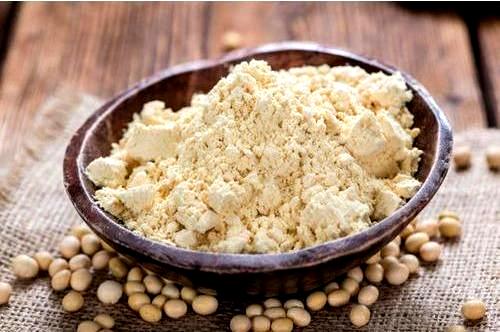
Here are a few of my key takeaways:
- A small amount of fat and no cholesterol – it is a complete source of pure protein. It is ideal if you’re looking for something that doesn’t contain a lot of fat and zero cholesterol.
- It contains phytates – protein isolate powder contains phytates, which is known to decrease mineral absorption. This is mainly one of the biggest reasons why it is so controversial.
- Complete protein source – it is a complete protein. This generally means it contains all of the nutrients and essential amino acids that your body needs. Basically, stuff your body relies on food for because it’s unable to produce them.
- Soy sits halfway – BCAAs are one of the essential aminos your body gets from food. Because of this, it’s important to make sure your food contains BCAAs. This amino acid facilitates muscle protein synthesis and allows you to build muscle. Unfortunately, soy is not what you would call the top pick if you’re looking for something that is effective in boosting muscle protein synthesis.
- Aids Weight Loss – studies have shown that diets that are rich in protein are effective if you want to lose weight. This allows you to basically eat what you need without calorie or nutrient restriction, all the while losing weight. However, there are mixed results when it comes to losing fat and soy protein. Some claim it as effective, while some have yet to see results.
Summary: Overall, soy protein is an excellent pick (like Bob’s Red Mill Soy Protein Powder) for anyone with dietary restrictions. However, it is important to exercise caution when taking in soy protein as the presence of phytates can make it difficult for your body to absorb the necessary nutrients. It’s also not as ideal for muscle protein synthesis where it is inferior to WHEY.
Soy vs Whey
There is some controversy surrounding soy protein vs whey proteins. Despite the competition, soy remains to be the most popular when it comes to plant-based protein or vegan protein choices. Whereas it is an excellent pick for those without dietary restrictions. Soy boosts estrogen levels.
Let’s break it down into smaller parts:
Texture and Flavor
Although it ultimately boils down to a personal pick, it is definitely more attractive when it comes to taste and texture. It usually boasts a smoother and creamier, somewhat velvety texture combined with a mild nutty flavor. Whereas soy protein tends to taste more strongly of nuts and is somewhat gainer compared to WHEY.
Shelf Life
Both are relatively stable when it comes to shelf life. In this case, people tend to worry about whey since it is derived from dairy. Despite that factor, though, it tends to keep very well. For example, you’re unlikely to develop any health issues after accidentally consuming a protein product past its consumption date. But you might find that the flavor is greatly diminished or altered.
Protein Type
While both are rich in amino acids that your body can’t naturally produce, each is richer than the other in some areas. For example, WHEY has a higher concentration of isoleucine, leucine, lysine, and methionine. At the same time, soy contains a higher concentration of arginine, phenylalanine, and tryptophan.
This concentration shows that it is essentially more effective compared to soy when it comes to building muscle mass and fat loss.
Summary: Ultimately, if you don’t have any dietary restrictions, I would highly suggest opting not for soy protein. For one, it’s proven to be more effective in areas like bodybuilding and weight loss. But more than that, it isn’t packed with phytates that could cause your body to reject necessary nutrients. If you are lactose-intolerant, I’d suggest looking into best hemp protein choices or pea protein.
Side Effects
Soy, in general, is known to cause a few mild or severe reactions. Ultimately, it’s important to know your body’s limits and do a test run of sorts prior to consuming large amounts of soy protein to make sure you’re safe.

- Mild stomach and intestinal issues
- Bloating
- Nausea
- Constipation
- Allergic reaction
- Anaphylaxis
- Tiredness
- Affected thyroid functions
Summary: Although soy is considered as a generally safe, it’s important to be cautious when trying anything for the first time. If you have any sensitivities or allergies, make sure you consult your physician prior to consuming any soy based protein. In addition, researchers only noted significantly decreased testosterone levels in those with very soy-heavy diet.
Those who argue in favor of soy products will point out the flaws in the above studies. Furthermore, they argue that the vast majority of research has not found any correlation between soy consumption and hormonal imbalance.
Does Soy Actually Raise Estrogen?
As a psychiatrist who specializes in infertility, I have done dozens of interviews with patients who were told they had cervical cancer when they did not. In my own studies, I have discovered that many women with tumors in the uterine cervix have indeed been misdiagnosed. The testicular cancer study is a new and radical way of looking at the issue. It found that people with some estrogen-producing cells in their bodies, and who consume large quantities of soy, have higher estrogen levels than those who don’t consume soy. Some women have also complained that they find it difficult to become pregnant, as they don’t produce the right amounts of progesterone. Soy may prevent that.
Many people are being treated for cancer of the cervix with Herceptin, a drug normally used to treat patients who have multiple myeloma, the blood cancer of plasma cells. Herceptin can destroy many types of cancer cells, but it will not kill healthy ones. In fact, it can cause cancers in many patients, because it comes with a risk of heart problems that are increased as a woman gets older. Herceptin and other such drugs have been introduced since the mid-1990s, and today are being given routinely to millions of women in Europe, Latin America, Asia, and North America. (In the U.S., many cancer patients do not have access to these drugs. They are covered by Medicare, but cannot be used for other diseases, so many go without.) The risk of heart disease in my patients has been elevated by the introduction of Herceptin treatment.
Is Soy Protein Powder Bad for You?
The main ingredient in all Soylent products is Soy Protein Isolate (SPI), which is a highly purified form of soya protein. This doesn’t mean it’s harmless to drink, though: Soy contains one of the highest ratios of phytic acid to other protein-digesting minerals, while total protein content is between 2 and 4% as opposed to around 6% in many other plant-based sources.
While the companies that make Soylent claim it’s nutritious, there’s actually no such thing as a “vegan or healthy” food. Even if the entire industrial production of the product could be completely stopped tomorrow, you can’t possibly consume enough protein from other sources to make up for the excessive levels of phytic acid in soya. There’s also no good reason to take up your spare protein supplement when you’re not sick or injured—and Soylent will cost you over $50 per day if you’re not exercising. Soy is unhealthy because it’s rich in hormones and estrogen-like substances.
Why is Soy Protein Powder Bad for You?
Folks usually buy soy protein powder to boost their protein intake because their diet doesn’t include enough protein from other sources. While soy protein powder contains a little protein, it is still far from high-protein. Only two-to-three grams of protein are contained in the same-sized container Bob’s Red, which is much less than other high-protein powders, like pea, egg, and flaxseed, which contain up to 20 grams per container.
It’s easy to get confused about soy protein’s health benefits. Before we talk about the myths and truths about soy protein, let’s discuss what soy is and how it is extracted. Soybeans are grown in one of the world’s largest producers of genetically modified seeds. These seeds are engineered to make soybeans produce more protein, which is used to replace the natural protein found in dairy, meat, eggs, and cheese.
What is the Healthiest Soy?
When I first began looking into the adverse health effects of soy, I was given a very brief rundown on soy and breast cancer. The general gist is that there is low-to-moderate evidence that consuming soy products (especially estrogenic soy, which includes tofu, soy milk, and tempeh) may increase your risk of breast cancer, but there’s still no concrete reason to avoid soy.
I asked Dr. Stachowski what was available for us and what else to consider. She wrote back, saying: In the absence of additional, independent support, soy is thought to be one of the most well-studied food substances for health, [and] soy is believed to reduce the risk of breast cancer. The American Cancer Society concludes that there is no strong evidence that the consumption of soy in the amounts recommended by the U.S. Department of Agriculture (USDA) is harmful, although most studies link it.
Is Soy Protein Isolate Constipating?
It should be no surprise that high-quality soy protein isolate has a higher glycemic index, which in general means a lower glycemic index is better for glucose management and weight management. This is especially true when it comes to soy protein isolate vs whey protein isolate. To take this a step further, you can actually reduce the glycemic impact of protein isolate if you choose a high-quality product and consume it with some carbohydrates.
There’s even more to this than that. Soy Protein Isolate Can Be Constipating. In order to formulate soy protein isolate into a product, it must undergo a three-stage process called lactose de-fugging. This is a standard protocol to reduce the GI impact of a protein isolate when it’s consumed by people with certain digestive.
What Are the Different Types of Soy Protein?
Soy protein, a plant-based protein derived from soybeans, comes in various forms, each offering unique characteristics and applications. The primary types of soy protein are soy protein concentrate (SPC), soy protein isolate (SPI), and textured soy protein (TSP).
Soy Protein Concentrate (SPC) is made by removing the fat and carbohydrates from soybeans, leaving a protein-rich powder. It contains about 70-80% protein by weight and retains more of the bean’s natural flavor and nutrients. SPC is commonly used in food products like meat alternatives, baked goods, and nutritional supplements.
Soy Protein Isolate (SPI) undergoes further processing to remove additional carbohydrates and fats, resulting in a product that is 90-95% protein. SPI is a versatile ingredient due to its neutral flavor and high protein content, making it a popular choice in protein bars, shakes, and infant formulas.
Textured Soy Protein (TSP), also known as textured vegetable protein (TVP), is made by processing defatted soy flour into a fibrous, meat-like texture. TSP is often used as a meat substitute in vegetarian and vegan dishes, providing a protein-rich alternative. It can absorb flavors well, making it adaptable to various culinary applications.
These different forms of soy protein offer diverse options for incorporating plant-based protein into a variety of products. Each type caters to specific needs, whether it be enhancing protein content, creating a meat-like texture, or preserving the natural flavor of soybeans. As a sustainable and nutritionally rich protein source, soy protein continues to play a crucial role in the food industry and dietary choices worldwide.
Is Soy Protein Powder Healthy?
“Soy protein powder can be a healthy addition to your diet, offering a range of benefits backed by scientific research.”
Soy protein is derived from soybeans, which are legumes known for their high protein content and nutritional value. Soy protein powder is a convenient way to incorporate this plant-based protein into your diet, particularly for individuals following vegetarian or vegan lifestyles or those looking to reduce their intake of animal-derived proteins.
One of the primary benefits of soy protein is its high-quality protein content. It contains all nine essential amino acids, making it a complete protein source comparable to animal-based proteins. These amino acids are crucial for muscle growth, repair, and overall health.
Research suggests that soy protein may offer several health benefits. Studies have shown that soy protein consumption may help lower levels of LDL cholesterol (often referred to as “bad” cholesterol), which can reduce the risk of heart disease. Additionally, soy protein has been associated with improvements in blood pressure and vascular health.
Another potential benefit of soy protein is its ability to support bone health. Soy contains isoflavones, which are plant compounds with estrogen-like properties. Some research suggests that isoflavones may help prevent bone loss and reduce the risk of osteoporosis, particularly in postmenopausal women.
Furthermore, soy protein may have positive effects on weight management and metabolic health. Incorporating soy protein into a balanced diet can help promote feelings of fullness and satiety, which may aid in weight loss or weight maintenance. Additionally, soy protein may improve insulin sensitivity and glycemic control, potentially reducing the risk of type 2 diabetes.
It’s important to note that while soy protein offers many health benefits, individuals with soy allergies or sensitivities should avoid soy-based products. Additionally, some concerns have been raised about the potential estrogenic effects of soy isoflavones, particularly in large amounts. However, current evidence suggests that moderate soy consumption is safe for most people and may even have protective effects against certain types of cancer, such as breast and prostate cancer.
When choosing a soy protein powder, opt for products that are minimally processed and free from additives or artificial ingredients. Look for products that contain organic, non-GMO soybeans and have undergone thorough quality testing.
In conclusion, soy protein powder can be a nutritious and healthy choice for individuals looking to increase their protein intake or incorporate more plant-based foods into their diet. With its high-quality protein content and potential health benefits, soy protein offers a valuable option for supporting overall health and well-being.
Final Words
Soy protein, in general, is very controversial. For starters, it contains a lot of phytates. Phytates are known to block nutrient and mineral absorption. So it isn’t unreasonable to think that it isn’t as healthy as it seems.
Additionally, studies have concluded that soy protein is not as effective for fat loss or muscle building as other types of protein.
Despite the above-mentioned drawbacks, there are still a few reasons you might opt for soy protein instead of other types of protein, such as dietary restrictions.
In spite of the controversy, it is still very popular. After all, powders are a good source of protein and necessary amino acids. Plus, they’re a viable vegan/vegetarian solution.
.
Furthermore, there are a handful of excellent powders on the market. There are a few things I like to look at to determine if a powder is worth your attention:
- Taste, flavor, and mixability – as a general rule, this soy powder by itself will rarely taste excellent. If you’re a health buff, I’d suggest opting for a pure and unflavored protein to make sure you’re getting all the nutrients you need. You can always mix it with other drinks or make a protein shake to make it taste better.
- Effects – generally, it’s excellent to see a spike in clean energy when you intake any soy powder. It should also have something to aid with digestion and contain a healthy dose of protein.
- Cost – nobody should have to spend too much on their health. Make sure this powder is sustainable and affordable.
Overall, Myprotein is the best choice for me. It mixes well, gives you a dose of clean energy that improves your focus, and aids in muscle recovery.
